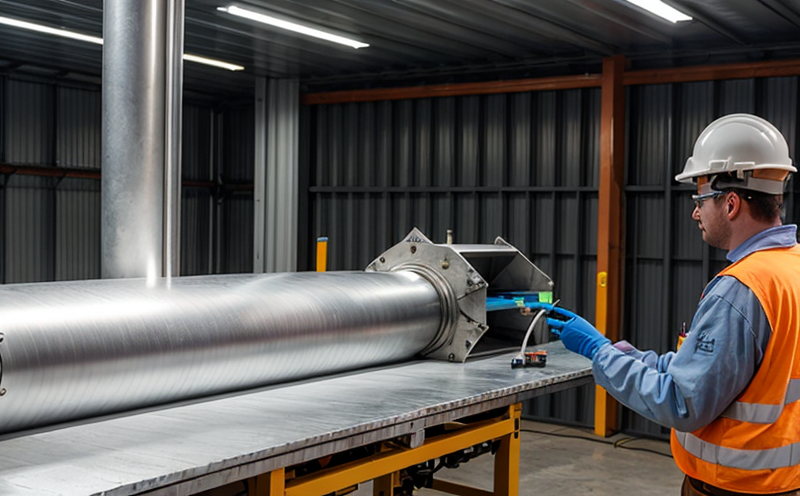IEC 62321 Hazardous Substance Testing in Renewable Components
The International Electrotechnical Commission (IEC) standard IEC 62321 is a critical guideline for manufacturers of renewable energy components, ensuring that they adhere to stringent environmental regulations. This standard specifies the allowable concentrations of hazardous substances in electrical and electronic equipment. Compliance with this standard is essential not only for regulatory adherence but also for maintaining product reliability and safety.
Our laboratory specializes in conducting IEC 62321 tests on renewable energy components such as photovoltaic panels, wind turbine parts, and other sustainable technologies. Our expertise lies in analyzing the presence of hazardous materials like lead (Pb), mercury (Hg), cadmium (Cd), hexavalent chromium (CrVI), polyvinyl chloride (PVC), and brominated flame retardants (BFRs). These tests are crucial for ensuring that products meet global environmental standards, thereby protecting both human health and the environment.
When conducting IEC 62321 testing, we follow a rigorous process. Specimens undergo thorough preparation to ensure accurate results. This includes cleaning, disassembly where necessary, and ensuring all parts are representative of the final product. Our state-of-the-art instrumentation allows us to measure trace amounts of hazardous substances with precision. Once tested, our reports provide detailed information on the concentrations detected, along with compliance status.
The importance of IEC 62321 cannot be overstated in today's regulatory landscape. Regulatory bodies like the European Union’s RoHS directive often reference this standard to ensure products are safe and sustainable. By partnering with our laboratory, manufacturers can avoid costly penalties and enhance their brand reputation by demonstrating a commitment to sustainability.
In addition to testing, we also offer training sessions for quality managers and compliance officers on how to integrate IEC 62321 into their product development cycles. Our R&D engineers can assist with material selection and substitution strategies that minimize the use of hazardous substances while maintaining product performance.
- Ensures compliance with global environmental standards
- Avoids regulatory penalties and fines
- Enhances brand reputation through sustainable practices
- Promotes safer products for end-users
We understand the competitive landscape faced by renewable energy manufacturers. Our services are designed to help companies stay ahead of regulations, ensuring they can confidently launch compliant and innovative products into marketplaces around the world.
Why It Matters
The importance of IEC 62321 testing cannot be overstated for manufacturers in the renewable energy sector. This standard directly impacts a company's ability to comply with international regulations, which are becoming increasingly stringent due to growing concerns over environmental health and safety. Non-compliance can lead to significant financial penalties and reputational damage.
By adhering to IEC 62321, manufacturers can ensure their products meet the highest standards of sustainability and reliability. This not only protects end-users but also contributes positively to the environment by reducing the presence of hazardous substances in electrical and electronic equipment. Our laboratory's expertise in this area allows us to provide accurate and reliable testing results, helping companies navigate complex regulatory environments.
Moreover, compliance with IEC 62321 is a key factor in building trust among customers and stakeholders. As sustainability becomes a critical differentiator in the market, demonstrating commitment to these standards can significantly enhance brand reputation and customer loyalty. Our services are designed to support manufacturers in achieving this goal by providing expert testing and guidance.
The global reach of IEC 62321 is another reason why it matters for renewable energy companies. As markets become more interconnected, adherence to international standards ensures that products can be sold worldwide without additional barriers. Our laboratory's expertise helps manufacturers meet these stringent requirements, opening up new opportunities in diverse regions.
In summary, IEC 62321 testing is essential for renewable energy manufacturers to ensure compliance with global regulations, protect end-users and the environment, enhance brand reputation, and open markets worldwide. By partnering with our laboratory, companies can confidently meet these requirements and stay ahead of industry trends.
Scope and Methodology
The scope of IEC 62321 testing encompasses a wide range of hazardous substances commonly found in electrical and electronic equipment. These include lead (Pb), mercury (Hg), cadmium (Cd), hexavalent chromium (CrVI), polyvinyl chloride (PVC), brominated flame retardants (BFRs), and others as specified by the standard. The methodology for conducting these tests is rigorous and precise, ensuring accurate results that are critical for regulatory compliance.
The testing process begins with specimen preparation. This involves cleaning components to remove any external contaminants, disassembling parts if necessary, and ensuring all samples are representative of the final product. Once prepared, the specimens undergo analysis using advanced instrumentation capable of detecting trace amounts of hazardous substances. This includes inductively coupled plasma mass spectrometry (ICP-MS) for metals like Pb, Hg, and Cd, as well as Fourier transform infrared spectroscopy (FTIR) for identifying organic compounds such as PVC.
After analysis, our laboratory generates comprehensive reports detailing the concentrations of hazardous substances detected. These reports include compliance assessments against relevant international standards such as IEC 62321, RoHS directive, and other applicable regulations. The reporting process is meticulous to ensure that all findings are clear and actionable for manufacturers.
Our methodology emphasizes accuracy and precision throughout the testing process. This includes using calibrated instruments, employing standardized procedures, and maintaining strict quality control measures. Our team of experts ensures that every test is conducted with the highest level of professionalism and integrity. By following this rigorous approach, we provide reliable and accurate results that are essential for regulatory compliance.
Compliance with IEC 62321 is not only about meeting current regulations but also preparing for future changes. Our laboratory stays up-to-date with the latest developments in the standard, ensuring that our testing methods remain relevant and effective. By partnering with us, manufacturers can be confident that their products will meet future regulatory requirements as well.





